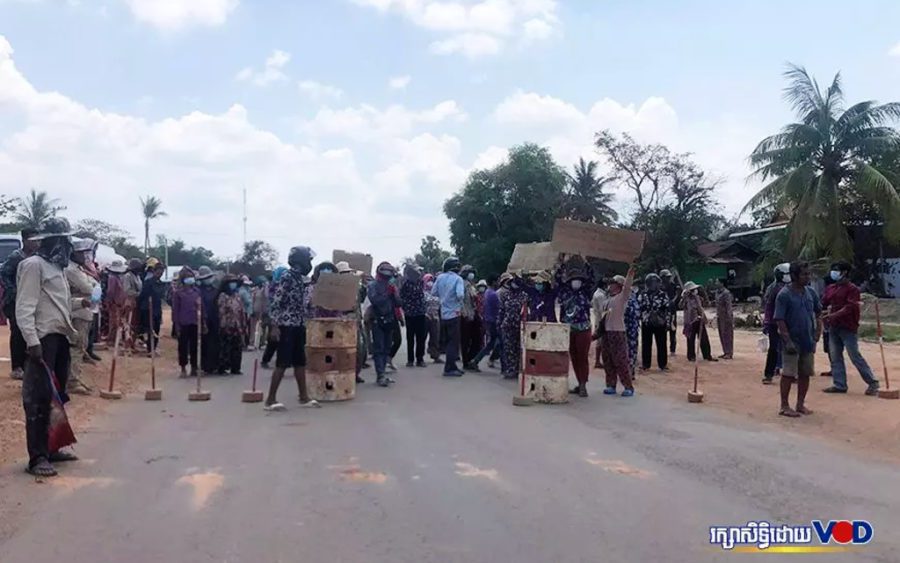Hundreds of Kampong Chhnang residents blocked a national road in Pursat province on Tuesday so they could resume farming on land they say they have tended for decades, as authorities confiscated a recorder and deleted photos belonging to a VOD reporter covering the protest.
Some 300 people from Kampong Chhnang’s Boribor district blocked the road in Pursat’s Krakor district after the Pursat authorities took back land in Ansar Chambak commune for redistribution among their province’s residents, said Phoun Makara, police chief in Kampong Chhnang’s Trapaing Chan commune.
The protestors blocked the road for about half an hour starting around 12:30 p.m. on Tuesday, Makara said.
Pen Thal, a protester from Trapaing Chan, said Pursat authorities had destroyed their rice farms when they tried to plow their fields this season, which led them to protest.
“The villagers have farmed the land for three generations, and there had been no problem. But it started in 2019 when Pursat took the land from Kampong Chhnang people,” she said. “They accused us of stealing their land. How can we steal your [land] since we have been cultivating this since our ancestors?”
She said their protests had been met by intimidation from Pursat authorities, not compromise. About three months ago, two villagers had been arrested and jailed over the dispute, she said.
“They warned us not to question them … and that we have no right to protest,” she said. “When we had a meeting with [authorities], we [were told we] can listen to them.”
She added that Pursat authorities also confiscated equipment from a journalist covering the event. The journalist she mentioned was a VOD Khmer reporter covering Tuesday’s protest while working from his home province.
“They took his phone and other things and deleted pictures in his phone, not allowing him to take pictures,” she said.
The equipment was returned, and the reporter, Khut Sokun, was able to take photos at a second protest later in the day.
Pursat deputy governor Cheng Lay said authorities had only confiscated the reporter’s equipment to make sure his information was clear.
“We gave [the equipment] back to him, and I have explained and instructed him to understand and write good news,” Lay said, saying reporting land issues could cause trouble. “Write what I say. It will not be wrong.”
Lay also denied that Tuesday’s events amounted to a protest, saying that the province’s authorities had invited Kampong Chhnang residents to discuss the land issue.
“We only take [land] from people who have recently cleared and encroached the land, and this was forest land,” he said. “Previously this was state land, and so it is illegal [to occupy the] land. The state’s principle is that people who have long cultivated the land, we will cut it off for them.”
He called people in Kampong Chhnang the encroachers, saying land had already been distributed to around 2,000 families in Ansar Chambak commune.
Boribor district governor Yim Sarin, in Kampong Chhnang, said he was working on a solution to the land issue with Pursat provincial authorities.
According to Sarin, 572 families from his district had grown rice on more than 1,000 hectares of Pursat’s Ansar Chambak commune since the 1980s or earlier. Pursat authorities had recently taken back the land, he said.
Sarin said the Pursat government had cut some of that land for its own residents, while promising it would distribute around 500 hectares to the Kampong Chhnang families who had farmed the area. But the families had not accepted the deal, he said.
“So far [authorities] have not yet cut it off for them and people have started to protest,” he said. “Some people have already plowed their land while others are now plowing their land, and they were stopped and arrested. … Now I have asked them to return to their homes.”













